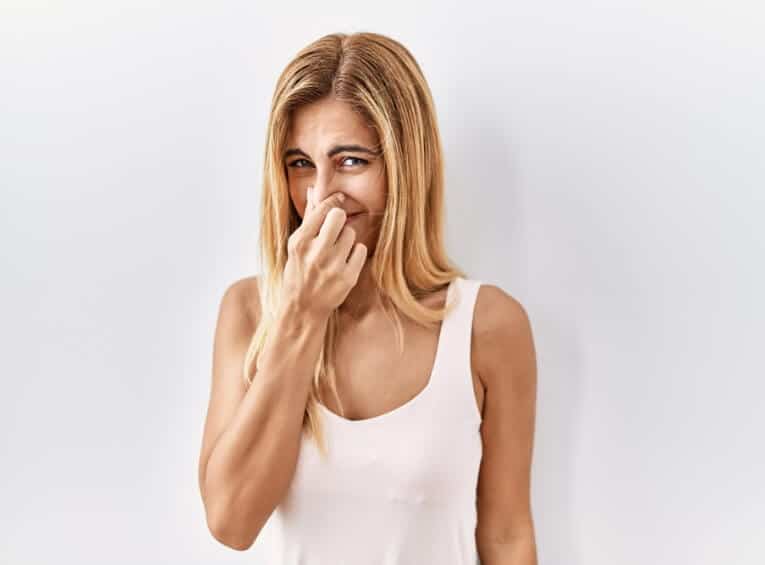Why Do the Earrings Smell?
Have you ever noticed how jewelry smells? Check right now: they can really smell bad. Most often this happens with earrings and piercing jewelry.
Precious metals and stones, as well as costume jewelry, do not have a smell . But while wearing them, they regularly come into contact with our skin, as well as other sources of pollution. Let’s figure out what caused the appearance of an unpleasant smell, and how to get rid of it.
Where Does Bad Smell Come From?
Our skin is constantly renewing itself. Up to 25 years, a complete renewal occurs every 23-28 days, then it slows down a bit – once every 35-40 days. In some areas of the skin, this renewal process is faster, in others it is slower. Dead cells accumulate on the surface of the epidermis. If they are not cleaned in time, they can lead to clogged pores: the skin will become dull, wilted, and will react worse to external stimuli. In addition to dead cells, sebum and dirt can accumulate on the surface of the skin – dust particles, remnants of cosmetics, perfumes.

They create a breeding ground for bacteria to grow. If you wear the same earrings for a long time without taking them off, the accumulation of dead cells and dirt can lead to an unpleasant odor. In addition, a grayish or brown coating will appear on the decoration in the lock area. People who regularly change their earrings face this problem much less frequently. Another possible cause is inflammation caused by infection of a fresh puncture. If the wound has not yet healed, it is important to follow the care rules suggested by the piercer or beautician.
Infection of the puncture area can lead to suppuration, and, as a result, the appearance of an unpleasant odor. Skin irritation may also occur as a result of an allergic reaction. Precious metals are considered hypoallergenic, but their alloys are used in jewelry, which contain impurities. For example, nickel allergy (present in some white gold alloys) occurs in 4-13% of the population.
What to do: solution options
There are several ways to get rid of an unpleasant odor:
- treat the puncture site;
- clean jewelry;
- change earrings or stop wearing them for a while.
If there are signs of severe inflammation, irritation, suppuration, you should contact the piercer who made the puncture, or a cosmetologist-dermatologist.

Maintain hygiene
Right after the piercing of the earlobe or other area, try to avoid re-injury. Do not tug or snag on the earrings, even if it does not cause serious discomfort. Make sure your hands are clean before removing or adjusting your earrings. You can also infect a fresh puncture by accident, during sleep. Keep your pillowcases and linens fresh. Do not allow pets, even if only temporarily, to sleep on your pillow. A fresh puncture can be treated with antiseptics.
Clean your jewelry regularly
Even if your jewelry looks clean on the outside, you need to clean it regularly. To do this, warm water with the addition of a couple of drops of liquid detergent is suitable. It is not recommended to use ordinary soap, as a whitish coating appears. For stubborn stains, you can use a soft-bristled toothbrush.
After cleaning, be sure to rinse the earrings in clean water and dry in the open air. If there is no way to clean the jewelry, antibacterial wipes will do. Wipe the lock and the part of the jewelry that comes into direct contact with the skin, and then let it dry.

Wear earrings that suit you
Some types of earrings are more prone to odor than others. For example, studs are tightly fixed in the earlobe, almost not shifting during wear. This can lead to the accumulation of a significant amount of dead cells, bacteria and impurities. Another risky option is broaching. Long earrings, resembling thin chains, are often tangled in the hair, which leads to microtrauma of the skin.
This increases the risk of infection and inflammation. When choosing earrings, make sure that the model suits you not only externally, but also sits comfortably in your ear. For example, some English locks may be too wide for thin piercings. And vice versa: if the earring hangs too much in the ear, this can lead to skin irritation. Avoid metals and alloys that can trigger an allergic reaction. Potential allergens include nickel, zinc, and copper. Hypoallergenic (that is, the safest) are jewelry made of titanium, sterling silver, gold with nickel-free marking.
Do not overdo it
In the pursuit of cleanliness, it is better not to become a fanatic. Aggressive chemical components present in antibacterial agents can provoke even more irritation and inflammation of the skin. In most cases, standard treatment of the puncture area is sufficient. Do not wear earrings around the clock, especially if they are jewelry. Exceptions – only for the duration of the healing of a fresh puncture. When it heals, be sure to remove your earrings at night: it will be safer for you and for jewelry.

